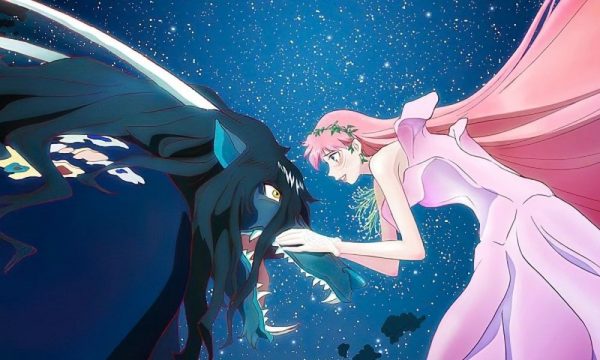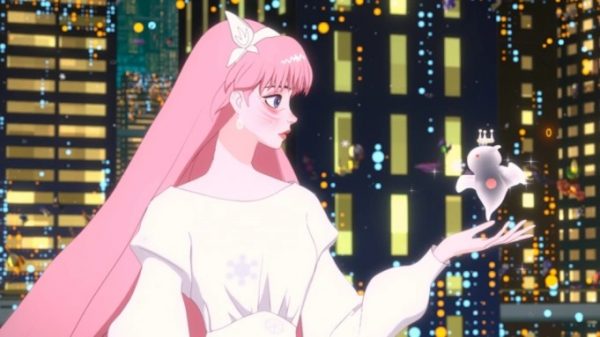Belle, 2022.
Directed by Mamoru Hasoda.
Featuring the voice talents of Kaho Nakamura, Ryô Narita, Shôta Sometani, Tina Tamashiro, Lilas Ikuta, Ryôko Moriyama, Michiko Shimizu, Fuyumi Sakamoto, Yoshimi Iwasaki, Sachiyo Nakao, Toshiyuki Morikawa, Mamoru Miyano, and Kôji Yakusho.

SYNOPSIS:
A high school student becomes a globally beloved singer after entering a fantastic virtual world. She soon embarks on an emotional and epic quest to uncover the identity of a mysterious beast who’s on the run from ruthless vigilantes.

We’ve seen Belle before, whether it’s in 1946’s La Belle et la Bete, or Disney’s 1991 classic, we’ve just not seen her filtered through the unique lens of Mirai director Mamoru Hasoda.
It would be quite reductive and misleading to say that Belle is anything near approaching a straight forward retelling of the Beauty and the Beast tale, because for large swathes of your journey through this wonderful world you’ve succumbed to the very different story that Hasoda is telling. In fact, the few times in which you’re removed from the film’s hold over you is when anything resembling either of the Mouse House iterations of Jeanne-Marie Leprince de Beaumont’s 1756 fairy-tale appears, because it’s so much more than that.
A little Ready Player One, but with a lot more heart, Belle operates using the Avatar trope of having a protagonist able to detach from their real-world limitations and problems in order to escape into a world in which they can be all they’ve ever wanted to be, without the condemnation of peers, fear of judgement, or oppression from the restrictions placed on them by society. Like the world of The Matrix, here the online world ‘U’ is a place in which the introverted, grief-burdened Suzu can find the voice she has lost in the outside world.

As with all of these Alice in Wonderland morality tales this a warning about how far you should journey down the rabbit hole before you lose yourself, but Belle is far from a condemnation of cyberspace, instead choosing to emphasise and embrace the beauty in being able to connect with people, while at the same time underlining the dangers. It’s an approach that results in a surprisingly dark, admirable and emotionally satisfying final act. There’s no race against time to stop the final petal falling from the rose here. There’s much more at stake than love.
The online world in which this tale of friendship and bravery plays out is truly spellbinding; we’re introduced to Suzu’s alter-ego avatar as she rides on the back of a giant humpback whale, singing the catchiest of pop-songs, as her adoring fans excitedly gather in their zeroes and ones around her. But as magical as those scenes are, the duvet covers are quickly pulled back to reveal Suzu’s offline world, and that’s where the true intrigue and emotion can be found.
Hasoda proved that he can delicately paint the intimacies of family dynamics with Mirai, and it’s no different here, with the details of Suzu’s broken home and tragic backstory emotionally told in flashbacks that are woven beautifully into the story. As much as the magical world of castles and cute avatars impress, the depiction of Suzu’s recognisible life of mundanity and isolation makes much more of an impact than the jaw-dropping visuals.
Belle takes familiar tales as old as time and upgrades them with swipe-down social commentary in a modern tale of love, loss and identifiable insecurities. It’s as touching and transcendent as filmmaking gets.
Flickering Myth Rating – Film ★ ★ ★ ★ ★ / Movie ★ ★ ★ ★ ★
Matt Rodgers – Follow me on Twitter











